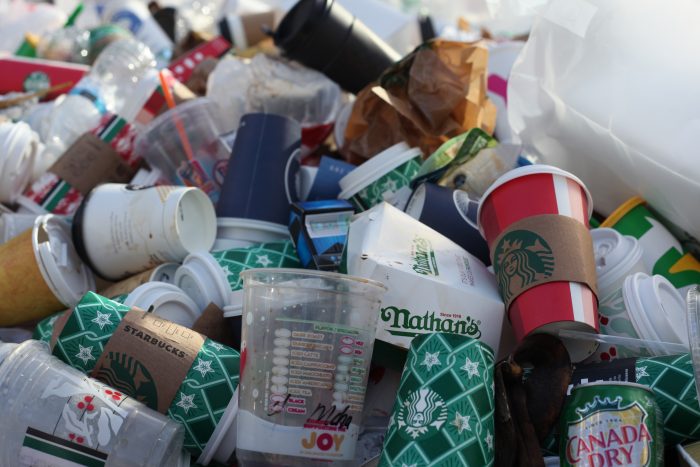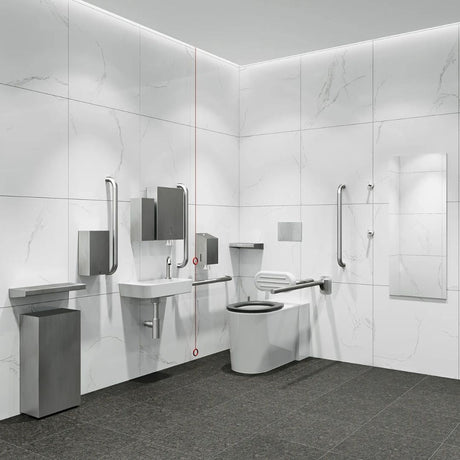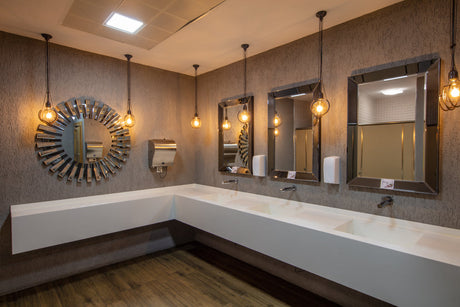Updated 08/02/2022

In 2019 Intelligent Facility Solutions were featured throughout the national press, including the Sun , Mirror, Times and Telegraph. The founder, Andy Cameron did numerous high profile media appearances including Adrian Chiles on Radio 5 live and the issue was discussed on The Wright Stuff, Holly and Phil and on Good Morning Britain.
Why?
Intelligent Facility Solutions were the first company in the UK, maybe the world to consult with staff over the potential ban of single-use plastics in the workplace. The ban, if accepted after a period of consultation would be written into workplace contracts.
So why did a medium sized hand dryer and bathroom accessories company want to implement such a policy?
Andy Cameron explained
‘It was more about mentality, as a business we stand for supplying products that reduce waste, like electric hand dryers that prevent trees from being continuously cut down and all the associated, production, transport, storage and disposal emissions that single-use products create. The office was awash with plastic bottles and sandwich packaging and I thought we needed to collectively think differently, to become less wasteful’
James Marvin, a long-term part of the team at Intelligent explained more about the process:
‘It got taken a little out of proportion by some media outlets, making out this was a policy implemented straight from the top, without our consultation, and that if we didn’t do it, we were to be given 3 warnings then sacked !I had to personally take to LinkedIn to let people know the true extent. That this was a trial, fully consulted with the staff and that any contract changing was to be done with our full consent. It seems the media, as you’re probably aware, like a bit of controversy’
‘It hasn’t all been negative though. There are a number of companies who have contacted us to praise what we’re doing, also asking for advice on best practice so that they can implement the ideas into their own environmental & sustainability policies’
This is exactly why Intelligent started this in the first place, obviously to reduce our own impact on the world, but also give tried and tested advice to others and having a sort of butterfly effect .
What did employees think?
We interviewed a couple of staff members during the trial to see how they were getting on. Both Richard and Kehinde spoke very positively of what was happening and that although challenging, it had made them both think about their habits when it came to food purchasing and recycling in general.
After the trial was over it was time for all the staff to get together and discuss how they wanted to take forward the ban on single use plastics. The questions put to us:
- Did we want to go the whole hog and have an outright ban?
- Did we want to do part of it?
- Did we find it that hard that we didn’t want to do any of it at all?
Whichever one we felt most appropriate, we were to come up with proposals of what we should do next.
The general consensus was we all really wanted to give it a full go but at the moment there seemed to be too much to think about whilst working at the same time. Some of the staff leave planning meals and snacking as a last-minute thing, as the most of the working population do, concentrating more on work than where to grab lunch or what snacks to get them through the day and what they’re wrapped in.
It’s been hard to find items without single use plastic as most shops don’t cater for this. You have to go out and find places and this takes away the convenience aspect we as a society have all come accustomed to.
I said in the discussion, did we need more education on where to get items that didn’t contain single use plastic, therefore do we need more time to adjust before we could make it an outright ban?
It does seem that although it’s possible to live single use plastic free, at the moment it’s a total change in lifestyle needed to do this. We need more awareness of where to buy items which create less waste and more single use plastic free products available which are convenient to purchase. This is a world where we automatically need everything yesterday to keep up with the speed of how fast the day flies. A habit is hard to break in a short period of time.
It was suggested that for this to be a complete ban, the company would need to provide more and more things on top of what it already was as some staff were finding it difficult to do alone. The cost of doing this ban had already reached a hefty price for the company to provide treats and snacks.
A point was made that a complete ban at this moment in time could make things worse, as people eating out of the office could be throwing plastic away rather than recycling it in the facilities that have been added to the office. We know that recycling should be the last option in the reduce, reuse, recycle mantra, but at least it has a chance in the office recycling bin than out in general waste.
Another interesting point made was a complete ban in the office may force people in the building to be good but due to limited options available to buy, things are getting taken out of single use plastic at home and into reusable tubs. This leaves the waste still at home to get rid of.
The Proposals
There were 2 main proposals put forward by the staff. They were happy for either of them to be written into contracts, on the provison that the contracts were written in a way to protect the staff if a change of ownership was to occur.
We all agreed we wanted to do more overall, but due to time constraints and limited availability of food and drinks without single use plastic some felt it would be difficult to implement a complete ban.
The first proposal put forward was to ban all single use plastic that could easily be got rid of and reduced. This included water bottles, salad packaging, sandwich packaging, milk bottles, plastic cutlery and cling film.
It wouldn’t include snacks such as crisps, chocolate and biscuits as they’re hard to find quickly and easily without being wrapped in single use plastic. The company has provided a range of cakes during the week, but they’re that good they’re gone within a day!
The second proposal was to incorporate single use plastic free days into the week, so that on just one or 2 days there was an outright ban. This allows for a more gradual way of people making a behaviour change, seeking out more information and finding places where items can be purchased without having to compromise on convenience or impacting on time.
As a side note, it was mentioned that we should start a compost bin so all food waste could be eliminated and the resulting matter given to the local community for their gardens.
The Vote
Eventually the team decided that with the support of the company, people were happy to ditch the plastic bottles and sandwich packaging but still wanted to have items like crisps and Chocolate bars if desired but would try and reduce these if the company was providing alternatives. Three years later and that adds up to literally 1000’s of bottles saved and packaged items no longer going in the bins.
To find out more about the policy or how we can reduce waste in your offices, please c ontact us .





